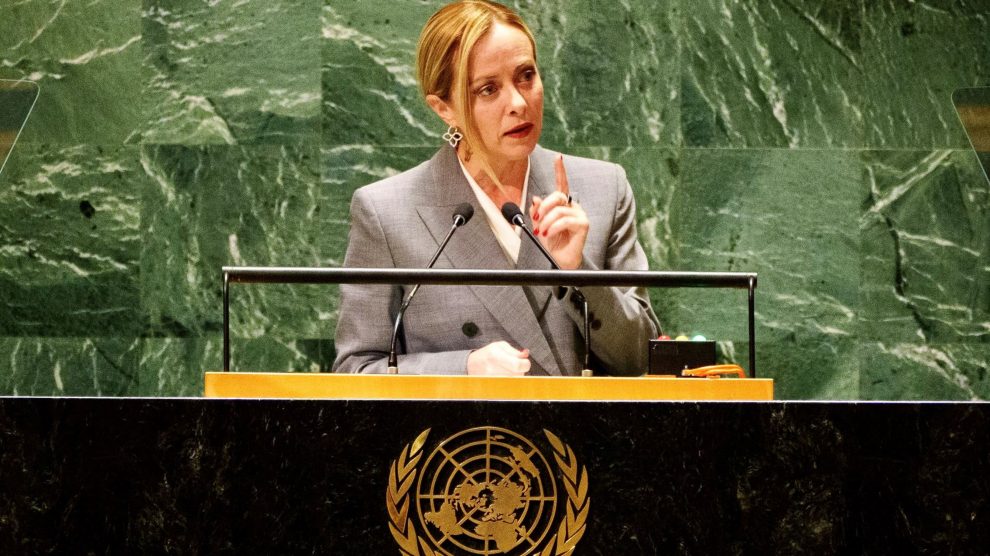Giorgia Meloni’s UNGA speech. In her first apparition among world leaders at the United Nations General Assembly on Wednesday, the Italian Prime Minister sought to frame Rome’s priorities: the defence of nations, of identities, of homelands, and the use of reason instead of force as the keys to “jointly” face the challenges of a “complex” era and return the UN’s spirit to its original purpose.
- This is true for Russia’s war of aggression against Ukraine, in the face of which Italy “has chosen sides”, but also true for governing phenomena like migration, an issue that involves everyone and which the UN cannot overlook.
- The themes that will define the Italian-led G-7 in 2024 were all anticipated in PM Meloni’s appeal: here they are.
Focus on Africa. Her line on addressing the migration issue runs on dual tracks. The first is acting together against the “new slavery,” that of illegal migrants, favoured by human smugglers. During her meeting with UN Secretary-General António Guterres, PM Meloni called for greater UN involvement on the matter. The second track addresses the root causes of migration by promoting development in the Global South – so as to ensure the “right not to emigrate,” as she put it.
- Almost all the debates the Italian PM took part in while in New York revolved around Africa. She previewed Rome’s plan of action, which will be further outlined when her government unveils the Mattei Plan next month.
- She described it as a “serious alternative to the phenomenon of mass migration, made up of work, training, opportunities in the countries of origin, and legal and agreed migration paths, and therefore also integrable.”
- The central point: “we must have the courage to put man, with his rights, back at the centre of our actions: a principle that is apparently taken for granted, but which is no longer taken for granted,” as she went on to say, recalling that “nations are being invaded, wealth is becoming more and more concentrated, poverty is spreading, slavery is re-emerging.”
Reforming the UN. As PM Meloni told the General Assembly, Italy “supports the need for a reform of the Security Council that makes it more representative, transparent and effective,” one that “guarantees a fairer geographical distribution of seats and also strengthens regional representation.” That’s in line with Rome’s leadership of the Uniting for Consensus group, which proposes exactly that.
- That same day, Deputy Foreign Minister Edmondo Cirielli chaired a meeting of foreign ministers from participating countries: Argentina, Canada, Colombia, Costa Rica, Malta, Mexico, Pakistan, South Korea, San Marino, Spain and Turkey (as well as Italy).
- The group’s objective is an urgent and comprehensive reform of the UN Security Council, to make it more democratic, representative, effective and accountable to the entire membership, in line with the objectives now shared and declared by all UN Member States.
Watch out for artificial intelligence. That’s another subject the Italian PM has repeatedly broached in talks with world leaders and experts. AI applications “certainly represent a great opportunity in many fields, but we cannot pretend that we do not also understand the enormous risks it brings,” she remarked. “I am not sure that we are sufficiently aware of the implications of a technological development that runs much faster than our ability to govern its effects.”
- “We used to be accustomed to progress aimed at optimising human capabilities, and today, we are confronted with progress that threatens to replace human capabilities. And whereas in the past this substitution focused on physical work, so that humans could concentrate on conceptual and organisational work, today it is the intellect that is in danger of being supplanted, with consequences that could be devastating, particularly in the labour market.”
- “More and more people will not be needed, in a world increasingly dominated by inequality, by the concentration of power and wealth in the hands of the few. This is not the world we want. And so I think we cannot make the mistake of considering this dominance a kind of ‘free zone’ without rules.”
- This means the world needs “global governance mechanisms that are capable of ensuring that these technologies respect ethical barriers, that the evolution of technology remains at the service of man and not vice versa,” she said. “We need to give practical application to the concept of algorethics, that is, to give ethics to algorithms.” Rome will place the issue at the centre of the G-7, she said, but all of the above are also issues that require the UN too.




